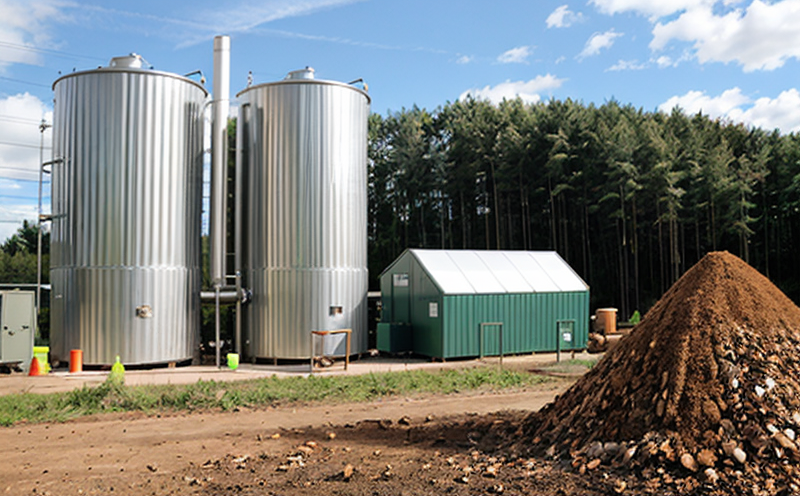ASTM E872 Volatile Matter in Biomass Waste Fuels
The ASTM E872 standard provides a precise method to determine the volatile matter content of biomass waste fuels. This service is crucial for quality managers, compliance officers, R&D engineers, and procurement teams as it ensures accurate characterization of biomass fuel quality. Understanding the volatile matter content helps in optimizing combustion processes, thereby enhancing efficiency and reducing emissions.
The ASTM E872 test involves heating a sample at 900 degrees Celsius under controlled conditions to determine the weight loss due to decomposition. This process separates the volatile components from the fixed carbon and ash content of the biomass fuel. The results provide valuable insights into the energy potential and combustion characteristics of the fuel, which are essential for waste-to-energy conversion processes.
Biomass waste fuels, especially those derived from municipal solid waste (MSW), agricultural residues, or forestry products, often contain a complex mix of organic compounds that can influence their performance in energy recovery systems. By analyzing volatile matter content, stakeholders can make informed decisions about fuel selection and process optimization.
The accurate measurement of volatile matter is not only critical for compliance with international standards like ISO 5864 but also plays a key role in ensuring the sustainability and efficiency of waste management practices. This test helps align with broader environmental goals by optimizing resource use and minimizing waste.
Understanding the ASTM E872 standard is essential for those involved in the development, procurement, and quality assurance of biomass fuels. It provides a standardized approach to ensure that all stakeholders are working from the same reference point, which fosters consistency and reliability across different projects and regions.
The test procedure outlined in ASTM E872 allows for repeatable and reproducible results, making it an indispensable tool in the field of waste management and recycling testing. This ensures that the data generated can be trusted and used to make evidence-based decisions about fuel quality and energy conversion processes.
Scope and Methodology
The ASTM E872 standard specifies a procedure for determining the volatile matter content of biomass waste fuels. The test involves heating a sample under controlled conditions to 900 degrees Celsius, maintaining this temperature for two hours, and then measuring the weight loss resulting from the decomposition process.
- Sampling: A representative sample is taken from the bulk material or a specific batch of fuel.
- Preparation: The sample is dried at 105°C to constant weight before testing.
- Heating: The prepared sample is placed in a crucible and heated under controlled conditions to 900°C for two hours.
- Weighing: After cooling, the crucible with the remaining material is weighed to determine the volatile matter content.
The results are reported as the percentage of weight lost during the heating process. This value provides a clear indication of the volatile components present in the biomass fuel, which can significantly impact its combustion efficiency and energy output.
Compliance with ASTM E872 ensures that all stakeholders are working towards a common goal of quality and consistency. By adhering to this standard, laboratories like Eurolab ensure accurate and reliable results that are recognized internationally, enhancing trust and credibility in the industry.
Eurolab Advantages
At Eurolab, we pride ourselves on delivering high-quality, accurate testing services for ASTM E872. Our state-of-the-art facilities and experienced personnel ensure that every test is conducted with precision and care.
- Accreditation: We are ISO 17025 accredited to perform this service.
- Expertise: Our team of experts has extensive experience in waste management testing, ensuring accurate results.
- Technology: We use advanced analytical instruments and techniques to ensure precise measurements.
- Precision: Our tests are repeatable and reproducible, providing consistent results every time.
- Compliance: Eurolab ensures that all tests comply with international standards like ASTM E872 and ISO 5864.
We offer a range of additional services to support our clients in meeting their compliance and quality assurance needs. Our comprehensive approach allows us to provide tailored solutions for specific industry requirements, ensuring that each client receives the best possible service.
Use Cases and Application Examples
- Energy Recovery: Accurately determining volatile matter content helps in optimizing combustion processes to maximize energy recovery from waste fuels.
- Quality Assurance: Regular testing ensures that the quality of biomass fuels meets specified standards, enhancing reliability across different applications.
- Research and Development: ASTM E872 results are invaluable for R&D teams in developing new processes and technologies for waste-to-energy conversion.
- Procurement: Testing before procurement ensures that the selected biomass fuels meet quality criteria, reducing risks associated with substandard materials.
- Compliance: Ensuring compliance with international standards like ISO 5864 is crucial for maintaining a positive reputation and meeting regulatory requirements.
- Sustainability: By optimizing fuel performance through accurate testing, stakeholders contribute to more sustainable waste management practices.
The results from ASTM E872 are used in various sectors, including municipal solid waste management, agricultural waste utilization, and forestry product recycling. These insights help drive innovation and efficiency across the industry.





